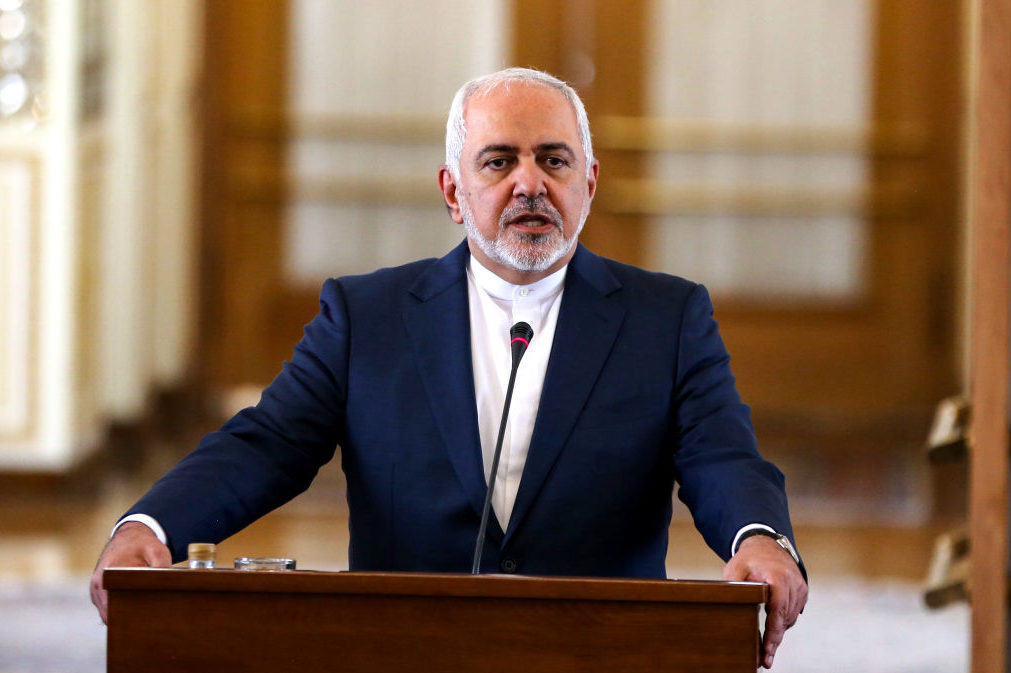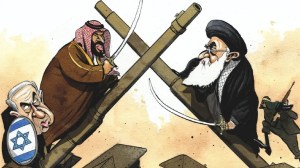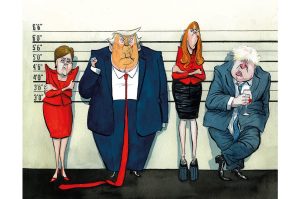Heiko Maas, the German foreign minister, was in Tehran on Monday. The ‘Iran conflict’, Maas said, is ‘one of the biggest conflicts of our time’.
No one wants war with Iran. But what would peace with Iran look like — and what exactly needs to be pacified?
The degree to which Maas’s statement was at once accurate and not accurate suggests the tricky nature of the ‘Iran conflict’. Iran’s forces are minimally engaged in conflict, but Iran’s proxies, Hezbollah especially, are everywhere engaged: in Lebanon, in Syria, in Yemen, and across Europe.
On Sunday, news from London showed how the Iranian regime uses its proxies to play a double game with the West. In 2015, while the JCPOA, the ‘Iran deal’ was being negotiated, British security services discovered that terrorists linked to Hezbollah had stockpiled a massive quantity of explosive material in London — over three tonnes of ammonium nitrate, more than was used in the Oklahoma City bombing.
British sources describe the stockpile as ‘part of an international Hezbollah plot to lay the groundwork for future attacks’. A larger cache had been found in Cyprus earlier in 2015. Tipped off by an unnamed security service, probably Israel’s, Cyprus authorities arrested a Lebanese-Canadian Hezbollah member. In 2017, a Hezbollah member in New York City was caught trying to assemble a similar stockpile.
Iran is accused of further terrorist activities in Europe. In the summer of 2018, following Donald Trump’s withdrawing of the United States from the Iran Deal, Iranian diplomats were expelled from Holland over alleged assassination attempts against Iranian exiles. The French government blamed Iranian intelligence for a foiled bomb plot against an opposition rally. The Danish government accused Iran of plotting kill an Iranian exile on its territory.
Meanwhile, the governments of Britain, France and Germany have tried to save the Iran Deal by placating Iran. After Trump withdrew the United States from the Iran deal and reinstated sanctions, Iran demanded that the deal’s European signatories create an alternative mechanism for sustaining its economy, especially its oil exports. The Europeans have done their best to sidestep the sanctions, but their best isn’t enough for Iran.
In January, Britain, France and Germany launched the Instrument in Support of Trade Exchanges (INSTEX). The European corporations that jumped into the Iran after the JCPOA was signed have backed off, wary of being excluded from American banks and markets. Instead of allowing for exchanges of Iranian oil for European industrial goods, INSTEX serves only Iran’s humanitarian needs: food, medicine, medical devices.
Members of the Obama administration, meanwhile, have advised Iran’s foreign minister Javad Zarif in his battle with the Trump administration. While Trump conducts gunboat diplomacy in the Gulf, his domestic opponents are believed to be serving as a back channel between Zarif and Congressional Democrats. It’s a staggering situation, and one that indicates how successfully Iran continues to split its opponents.
The Europeans are also divided. Last week, France’s president Emmanuel Macron said that he had ‘the same objective’ as Donald Trump, preventing Iran from developing nuclear weapons. The British have banned Hezbollah in its entirety, having previously banned only Hezbollah’s military wing. But the Germans are trying to revive the already dead Iran deal, and taking a softer line on Hezbollah.
Last week, Angela Merkel ignored requests from Germany’s Jewish community to ban the Iran-sponsored Quds Day march, an annual festival of anti-Semitic incitement. On Saturday, the Bundestag voted against banning Hezbollah in Germany — against strong pressure from the United States.
It’s rumored that the reasons for the recent British decision to completely prohibit Hezbollah in Britain were not just American pressure, but also American displeasure at the involvement of ex-British spy Christopher Steele in the gestation of the dossier of anti-Trump allegations that were investigated in the Mueller report.
‘My immediate reaction is to be very skeptical,’ an experienced ex-Conservative minister told me this week on condition of anonymity. ‘Christopher Steele is a bit of a buccaneer, but I do not believe that the British government would make a decision on Hezbollah that they wouldn’t have made otherwise.’
My source suspected that Britain, like France, is seeking to restore trust after the split with the United States over Trump’s withdrawal from the JCPOA and the European effort to help Iran avoid the impact of American sanctions.
‘I’d be more inclined to believe that because the UK has not felt able to support the US on the Iran nuclear deal, this has been one way to mend fences, which the Foreign Office would certainly be happy with. There might have been a consideration of timing: As we are having disagreements with the US over Iran, maybe this is a good time.’
Another well-placed source, also speaking anonymously, traces the British shift to ‘huge pressure’ from the United States, but to also domestic politics and the ‘massive support’ of Home Secretary Savid Javid, who is now in the running to replace Theresa May: ‘As the first Muslim Home Secretary, he feels empowered to go further.’
This source adds that the banning ‘does more than hit Hezbollah’. It hits ‘Jezbollah’ too — Labour’s Jeremy Corbyn, the Leader of the Opposition who has described Hezbollah and Hamas as ‘friends’, and who my source describes as ‘a terrorist-supporting threat to UK national security’.
Heiko Maas got nowhere in Tehran on Monday. While Macron and Trump agree on reducing Iran’s ballistic missile capability and containing its regional activity, Maas’s interlocutors simply refused to discuss missiles or Hezbollah or Yemen or Syria. Instead, Iran’s foreign ministry spokesman Abbas Mousavi insisted on Monday night that Tehran ‘will not discuss any issue beyond the nuclear deal’ and, despite the establishment of INSTEX earlier this year, the Iranian regime has ‘seen no practical or tangible steps from the Europeans’.
Mousavi’s statement should disabuse anyone who thinks that the ‘Iran conflict’ can be ended simply by returning to the JCPOA. That deal excluded Iran’s ballistic missile development, and its use of terrorist proxies like Hezbollah. Iran claims, not without reason, to be on the receiving end of economic warfare from the United States. By the same logic, we must admit that Iran continues to use terrorism as an instrument of foreign policy.
If peace with Iran means the Iranian regime abandoning terrorism, a weapon which has brought it to quasi-imperial influence in the Middle East, then we are further from peace with Iran than the JCPOA might have suggested, and even further from it today.
Dominic Green is Life & Arts Editor of Spectator USA.


















